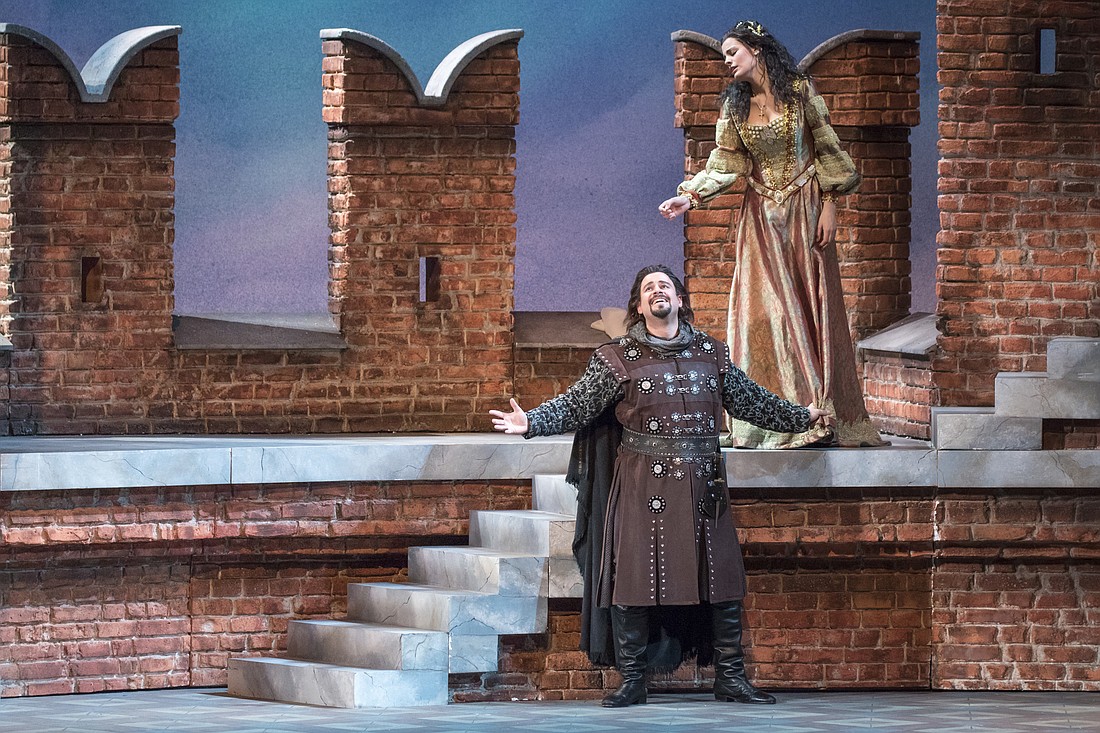- July 26, 2024
-
-
Loading

Loading

Italo Montemezzi, who lived well into the first half of the 20th century, can’t be considered a contemporary composer based on his work, “L’amore dei tre re,” which was completed in 1913. It’s not when it was composed but, rather, how it was written. You hear a lot of Wagner, and there are swirls of Richard Strauss, especially in the orchestra. It’s melodramatic, musically, and certainly, dramatically, but it’s neither verismo nor romantic opera. So, just what is it?
“L’amore dei tre re,” (The Love of Three Kings) was extremely popular with some of the greatest names in opera at the beginning of the 20th century. At the Met, it starred the likes of Lucrezia Bori, Rosa Ponselle and Ezio Pinza in the early days, and in 1941, Grace Moore (with the composer conducting), and eight seasons later, Dorothy Kirsten. But then it disappeared from the roster and has only been offered as a rare warhorse-of-a-piece in a few houses around the world, since.
What happened?
Montemezzi had a little competition from a few other composers who were popular at about the same time, Puccini and Verdi, among them. Being composers of the theater, they brought insight and emotional understanding to both the music and the drama, not to mention memorable arias and a style that grew in popularity. So, much like Zandonai’s “Francesca da Rimini,” written about the same time as Three Kings, the Montemezzi became relegated to rarity status mid-20th century. And that’s why Sarasota Opera’s production is so important.
In fact, Sarasota Opera offered it about 15 years ago, but this new, spectacularly beautiful production takes on a whole new shine. The scenery by David P. Gordon is stunning, especially the Act III opening tableau that looks like a Medieval painting, in which even the candles don’t flicker, no less the mourners surrounding Fiora’s bier in the cold crypt. Ken Yunker’s immaculate lighting casts shadows of death everywhere, and Howard Tsvi Kaplan’s costumes, heavy enough to weigh down the most athletic of singers, are so period oriented they have those fleas jumping out of them again. This may be melodrama, but it captures the period of the Dark Ages with an eerie, deathly pall.
And death there is, all around. You know it from the first notes played by the excellent Sarasota Opera Orchestra under the expert guidance of Victor DeRenzi. (Listen for some exquisite solos in the orchestra, including a beauty from the principal viola in the last act.)
This is one of those operas where, like a Shakespearean tragedy, almost everyone dies at the end, and that’s no spoiler alert. It’s how they meet their ends that makes this opera a standout among body counts on stage. Strangulation, poison, suicide and even love kill off almost all the leads, but — and this may be another reason the opera lost its popularity — not a tear is shed at the end for these characters.
Stage director Stephanie Sundine brought out all the emotion she could wring from this very static opera. The music may meander and swirl with Straussian passion, but the characters are singularly monolithic, and Sundine had the performers play their melodramatic roles with all the proper cultural understanding possible.
The small cast features four leading roles who are pivotal to the story line. Bass Kevin Short returned to Sarasota Opera as the blind king, Archibaldo, who sees more through his sightless eyes than any other character on stage. We’re told Short wore a blindfold during rehearsals, and it worked beautifully for his characterization. Short has become a great singing actor, making melodrama believable with his strong, resonant and often beautiful voice and intellectually stimulating acting. If you see this opera (and you should), watch and listen to him as he portrays a father who deeply loves his son and perhaps his daughter-in-law, even if he does her in with a stranglehold worthy of the wrestler Short has been in real-life.
Marco Nisticò turns in a fine performance as Manfredo, Archibaldo’s son, the love-smitten husband, blinded by love for a wife who loves another. He’s as compassionate and close to a character for whom one might weep if this weren't such a melodramatic piece.
Avito, sung with great passion and skill by tenor Matthew Vickers, is more than just another gorgeous voice. He is deliriously in love, and you understand how he dies for his indiscretion.
Elizabeth Tredent is positively splendid in the all-important role of the beautiful Fiora, for whom all three royals fall and fall hard. Her voice is enough to make audience members fall for her, as well. And her acting works beautifully with her spectacularly produced voice.
Smaller roles were handled with the same beauty and excellence as the leads by Dave Suarez (Flaminio), Mark Tempesta (a young man) and Anna Bridgman (a handmaiden).
It must be said that this opera has more make-out scenes than almost anything I’ve seen except in a Gidget movie. Kisses abound and, anytime the singers have a chance to rest, especially Avito and Fiora, they do it with their lips locked together. Come to think of it, it’s Fiora’s Kiss of Death that literally does her lovers in. But she doesn’t do it knowingly, being dead at the time.
Okay. It’s easy to make fun of this work because it’s so out of style these days. But thank goodness Sarasota Opera chose to present it, especially in such a stunning production. It’s a rarity for good reason and all that gives us good reason to see it.